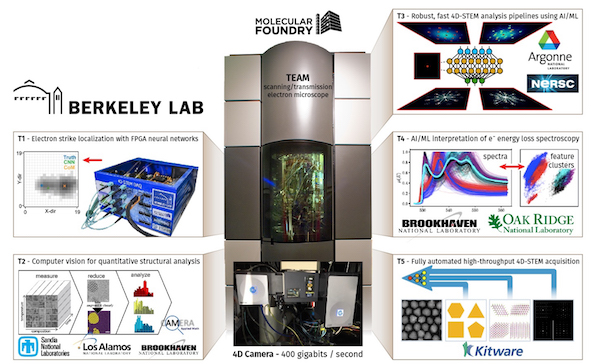This article was adapted from ALSNews.
The ever-increasing quantity of data collected at scientific user facilities offers the opportunity to glean unprecedented interdisciplinary insights. To take full advantage of the wealth of information, researchers are turning to artificial intelligence (AI) and machine learning (ML) to pose and answer complex scientific questions. The U.S. Department of Energy (DOE) Basic Energy Sciences (BES) program recently awarded a combined $8.55 million to two Berkeley Lab-led teams for projects “aimed at both automating facility operations and managing data modeling, acquisition, mining, and analysis for the interpretation of experimental results.” In the press release announcing the awards, Chris Fall, Director of DOE’s Office of Science said, “These awards will help ensure America remains on the cutting edge of these critical technologies for science.”

At the Molecular Foundry, the National Center for Electron Microscopy (NCEM) has long been a leader in electron-optical characterization of materials, hosting a suite of state-of-the-art instrumentation and world-class expertise. Last year, a team of researchers introduced the fastest electron detector ever made. Known as the “4D Camera” (for Dynamic Diffraction Direct Detector), the detector can generate a daunting 4 terabytes of data per minute at 87 kHz. The massive data velocities and volumes present a significant challenge for moving, storing, and processing information.
Now, a team led by Andrew Minor, Director of NCEM, was awarded $4.275 million over three years by DOE to develop the 4DCamera Distillery, a program that will develop and deploy methods and tools based on AI and ML to analyze electron scattering information from the data streams of fast direct electron detectors. The team behind the effort, composed of researchers from Brookhaven National Laboratory, Oak Ridge National Laboratory, Argonne National Laboratory, Sandia National Laboratory, and Los Alamos National Laboratory, as well as Berkeley Lab, will address both the critical need for data reduction tools for these detectors and capitalize on the scientific opportunities to create new modes of measurement and experimentation that are enabled by fast electron detection.
“The 4DCamera Distillery combines expertise in electron microscopy experimentation, detector technology, and leading-edge AI/ML researchers,” said Minor. “It will enable materials characterization that is in high demand by the DOE Nanoscience Research Center user community.”

